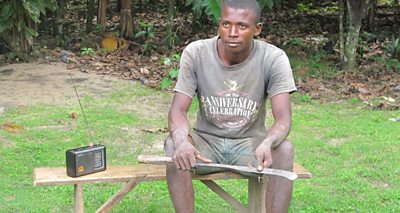Downloads
Firstly, I learned to cut down old cocoa trees. Secondly, I learned to give little shade and sun to the cocoa trees. These practices have helped increase my harvest.
Publication date: October 2015
Summary
����ý Media Action’s ‘Pathways to Learning’ project in the Eastern region of Sierra Leone aimed to improve farmers’ skills and knowledge about cocoa farming. Evaluation work in 2015 shows how farmers and local experts feel the project has helped to develop these.
The project
Between 2011 and 2015, ����ý Media Action was funded by the European Union (EU), the Deutsche Gesellschaft für Technische Zusammenarbeit (GTZ) and Interchurch Organisation for Development Cooperation (ICCO) to run the ‘Pathways for Learning’ project in Kenema, Kono and Kailahun – the three districts of the Eastern region of Sierra Leone. The project was run in partnership with Eastern Radio and Njala University, and included the production and broadcast of a package of radio programmes about the cocoa sector for farmers and potential farmers; a distance learning programme which took accredited learning directly to farmers through Farmer Field Schools; and intensive in-station training for local radio station partners – most notably Eastern Radio.
Research approach
This research in June and July 2015 included focus group discussions in all three districts with attendees of Farmer Field Schools, cocoa farmers who had listened to the programme and with non-cocoa farmers who had also listened to the programme. In-depth interviews were undertaken with experts in the local cocoa market – for example, cocoa buyers, produce inspectors and staff at local NGOs. A small survey was also undertaken with the general public. The study sought to understand whether farmers felt that their skills and knowledge about cocoa farming had changed as a result of the project, and how the project may also have contributed to raising awareness about other local development issues – for example, land rights or financial management.
Project context
Formative research carried out at the start of this project had noted that although cocoa farming is a common activity in eastern Sierra Leone, there were a number of key points in the cocoa production cycle of which farmers had gaps in their knowledge. In particular, the research highlighted information needs around disease management, tending to the farm, drying, bean selection, storage and harvesting.
The project was also affected by the outbreak of Ebola in 2014. Farmer Field School activities were postponed as a result from August 2014 until February 2015. Participants in the resumed sessions were required to wash their hands and check their temperatures before attending them. The sessions then included a reminder of Ebola prevention, transmission and treatment information.
Key findings
Developing farmers’ skills and knowledge
- Programme listeners and attendees of Farmer Field Schools reported that they had acquired new skills and knowledge across all stages of the cocoa production cycle, from planting to harvesting.
- Listeners and Farmer Field School attendees reported greater awareness of cocoa marketing and of strategies for negotiating good sale prices. This included having access to weekly cocoa prices, which helped them to agree fair prices with buyers, and awareness of tips which could help them conduct negotiations more effectively.
- Some farmers and experts noted that the application of skills and knowledge learned through both programmes could have a beneficial effect on both quantity and quality of farmers’ yields
Raising awareness of other local issues
- Listeners highlighted a number of broader issues which the programme had also given them information about, including education, health and women’s rights
- Listeners noted a range of skills that the programme had passed on in relation to financial awareness, including avoiding loan-taking and the benefits of collective working to avoid large outgoings for labour costs.
Implications and impact
The shows included in the ‘Pathways to Learning’ project were distributed on local radio, in some of the most common local languages, and included locally appropriate advice which listeners were likely to have the resources to put into action. These have led to a number of positive outcomes for some listeners, which some experts noted could also be felt in the wider sector.
The addition of a distance learning element to complement the project, which was conducted through Farmer Field Schools across cocoa farming communities in the eastern region meant that more than 5,000 farmers could receive targeted learning, and receive an accredited qualification from Njala University.
Furthermore, by working to strengthen capacity at local radio stations – including through co-producing radio programmes - the project was able to develop the capacity of journalists in the three districts to produce programming of higher technical quality, and also to build journalists’ understanding of the kind of information that local farmers need.
For more information about our research in Sierra Leone, please see .
